In an era of rapiddevelopment and accelerated iterations, many people may wonder how to preserve theircore competitiveness, and become a core member in an enterprise or organization.On May 28, 2019, the20th session of CUFE-United Together “Drive Career Development ofBusiness School • Lecture” was held successfully at the MBA Education Center,Central University of Finance and Economics (CUFE). Mr. Wu Dayou, a senior partnerof the United Together Business School, was invited to give a lecture titledDecodingHow to Become an Innovator in Your Organization. The event waswell-attended with a great atmosphere. Luan Tian, a teacher from the CUFE MBAEducation Center, hosted the event and presented a CUFE souvenir to the guestspeaker on behalf of the MBA Education Center.
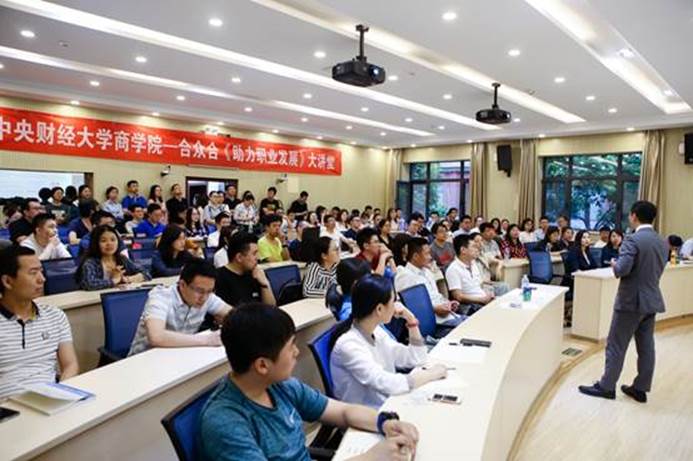
A scene from the event
Mr. Wu is a postdoctoralresearch fellow of the innovation management programatCambridge University, an expert certified by the GlobalInnovation Management Institute of Harvard University and the Stanford behaviordesign research fellow and educator B. J. Fogg, and a senior partner of theUnitedTogether Business School.
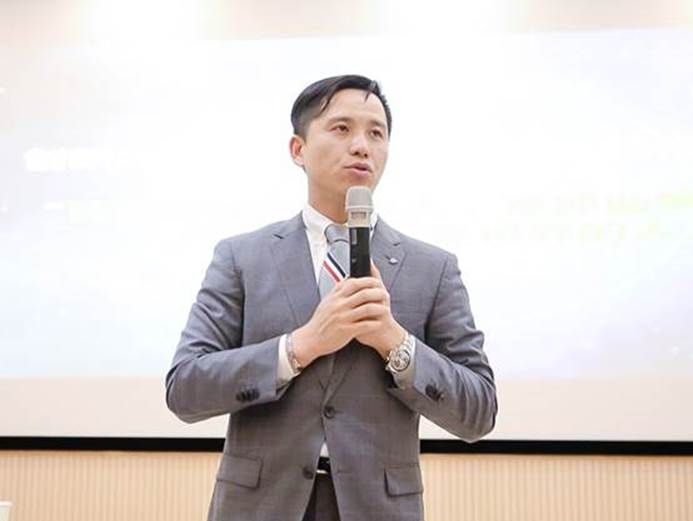
Mr. Wu Dayou, asenior partner of theUnited TogetherBusiness School
The lecture was centeredon three topics, namely, “Killer Tips to Remain Highly Competitive in an Era ofUncertainties,” “Five Core Skills in Innovation,” and “Three Innovation DNAs ofan Organization.” Mr. Wu elaborated on essentials for workplace success andillustrated how to become innovative, high-potential talents in anorganization, so as to help students in attendance to effectively acquireinnovation capabilities, strengthen core skills, and enhance theircompetitiveness in the workplace.
How to Forge Game-changingInnovative Organizations and Individuals
Mr. Wu started hislecture by citing the China-US trade war. He noted that “copycat” enterpriseswhich adopt the strategy of small profits but quick turnover cannot survive inthe long run, and only those innovative organizations driven by technologiesand data can achieve sustainable development in the future. At present, mostChinese enterprises have not arrived at the initial stage of innovativebusinesses yet, and people in the workplace are faced with pressure of jobcompetency. Against this backdrop, it appears urgent to discuss the topic of “Howto ForgeGame-changingInnovative Organizations and Individuals.”
How to develop yourinnovator’s DNA? People, process, and philosophies are three major factors inthis regard, among which people play a key part. According to Mr. Wu, humanity,technologies, and business expertise should complement each other to constructa team or an organization. Citing the cases of leading enterprises like Appleand Amazon, he stressed that “innovation always comes from humanity.”
Analyze InnovationIssues through Thinking, Observing, Networking, and Experimenting
Thinking, observing,networking, and experimenting are four major components of a process, eachfeaturing different connotations. Thinking can generate creative insights, asonly by figuring out and challenging the status quo can one raise innovativequestions. Nowadays, the value and height of life is determined by one’s rightto choose; with the capability to address problems, one will also be capable ofrealizing values and obtaining the right to choose. Mr. Wu believed thatinnovation is essentially aimed at addressing problems, and that autonomy,feasibility and supportability are three major elements to help one become aninnovator — and a happy one at that.
In addition, for mostinnovators, observing is a key discovery skill. One should observe customers, companies,and any inspiring stuff with all the senses, so as to sharpen his/hercapability for observing. By actively observing customers and buildingworkarounds, one can find out “unintended incidents” and change theenvironment, thus able to better complete tasks. Mr. Wu emphasized that “allinnovators are outstanding learners, as by observing they can avoid mistakesthat they used to make.”
“5,” “50” and “100” arethree key numbers in one’s core networking group. People should push theboundaries of traditional thinking, tap outside experts, attend idea networkingevents, form a personal networking group, and develop skills for ideanetworking. For experimenting, one should try out new experiences, take apartproducts, processes and ideas, test ideas through pilots and prototypes, andthus achieve innovations.
Mr. Wu held thatinnovation is the responsibility of everyone. Disruptive innovation is part ofthe innovation portfolio of a company. In the most innovative companies, smallproject teams are the key to opening up markets: therefore, people shouldmobilize and build up such teams and “take risks” skillfully at the same timeto pursue innovations.
ActivatePotentials and Cultivate Core Competitiveness
According to Mr. Wu,there are four types of potentials, including leadership quotient (LQ),intelligence quotient (IQ), emotional quotient (EQ), and adaptability quotient(AQ) — these can serve as criteria for talent selection and cultivation effortsin the future such as talent recruitment, talent assessment, and cultivation ofmiddle and top management. And nowadays, innovation represents the mostimportant core competitiveness among all types of potentials. During hislecture, Mr. Wu said that “innovation is an investment in both oneself andothers,” encouraging students to take actions to become innovators.
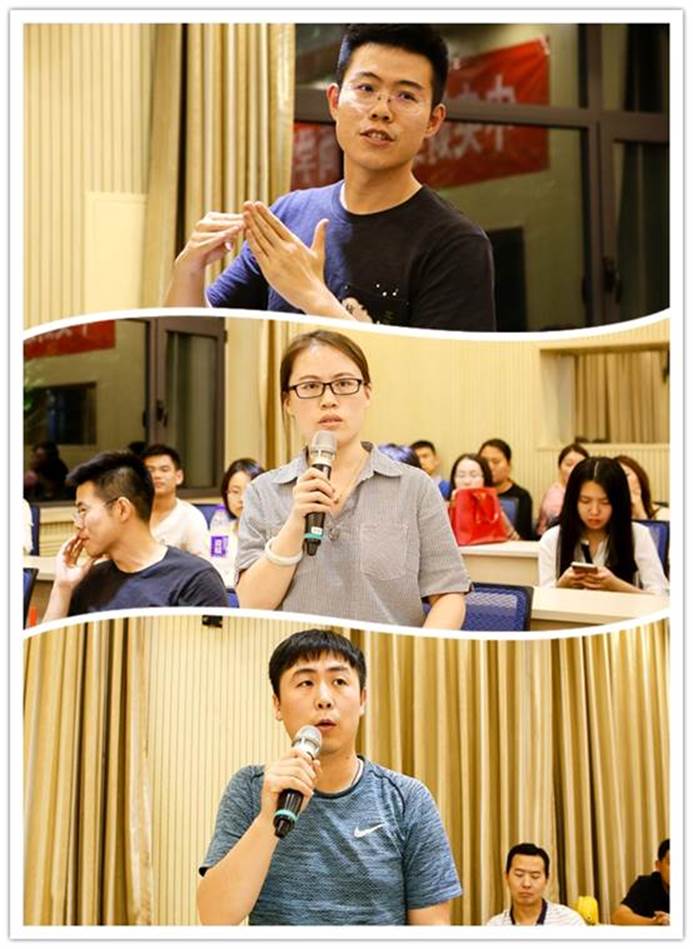
Q&A session
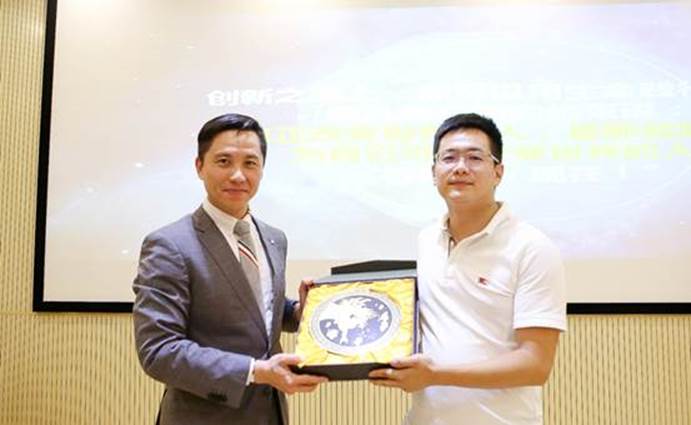
Presentation of a souvenir
During the Q&Asession, Mr. Wu answered questions pertaining to innovation-related hot-buttonissues, boundaries of innovation, etc. in a warm atmosphere.
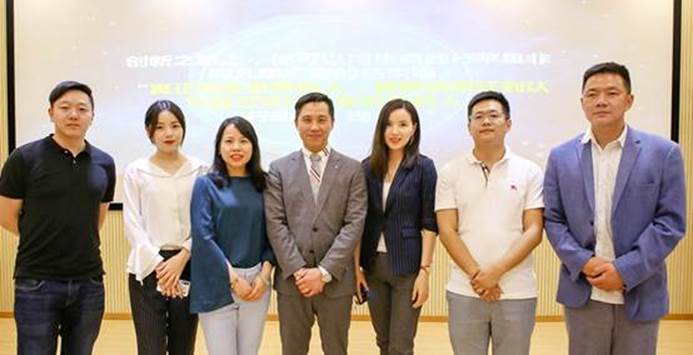
Group photo